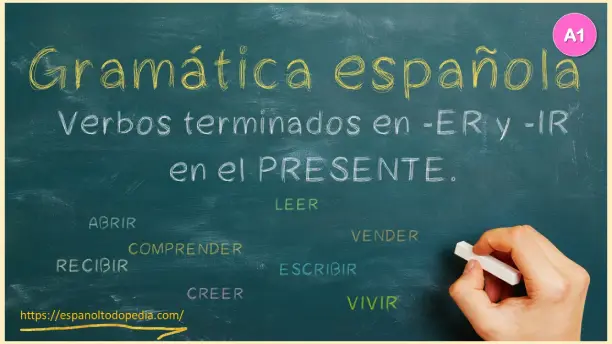 | In this lesson, we are going to study how to form the present tense of Spanish -ER and -IR verbs. Remember that Spanish verbs can be organized into three groups: those ending in -AR (the largest group), those ending in -ER, and those ending in -IR. |
In the video below, with explanations in English, you can discover all the secrets to conjugating and correctly using verbs ending in -ER and -IR in the present tense. Before we begin, make sure you have reviewed the lesson on verbs ending in -AR.
Now we will review the conjugation of the two groups independently.
Verbs Ending in -ER in the Present Tense
Within the group of verbs ending in -ER, there are some very useful and commonly used verbs such as comer (to eat), beber (to drink), hacer (to do/make), tener (to have), leer (to read), ver (to see/watch), and comprender (to understand).
Today, we are going to focus on regular verbs in the present tense. Please check the chart and examples below.

Anyway, the best thing is that you see some examples:
- No como carne, soy vegetariana (I don’t eat meat, I am a vegetarian).
- ¿Qué haces normalmente los domingos (What do you normally do on Sundays)?
- Carlos lee muchos libros sobre Egipto (Carlos reads many books about Egypt).
- Por la noche, vemos la televisión antes de dormir (At night we watch televisión before sleeping).
- Tu marido y tú tenéis una casa muy bonita (You and your husband have a very nice house).
- Mis hijos beben muchos zumos (My children drink a lot of juice).
Verbs Ending in -IR in the Present Tense
Here you have some examples of proper verbs ending in -IR, such as vivir (to live), escribir (to write), abrir (to open), recibir (to receive), sentir (to feel), dormir (to sleep), salir (to leave), and preferir (to prefer).
Careful! Some of these verbs are irregular in the present tense (you can check the conjugation of the irregular ones in the link). Unfortunately, many verbs ending in -IR are irregular, so pay special attention to this group.
Below, you’ll find a chart with the conjugation of -IR verbs.

As you may notice, the conjugation of verbs ending in -ER and -IR is very similar, except for the nosotros and vosotros forms.
- Leemos muchas novelas (we read many novels).
- Abrimos las ventanas siempre (we always open the windows).
- ¿Vosotros coméis muchas verduras? (Do you all eat a lot of vegetables?).
- Vosotros escribís muchos mensajes (you write many emails).
Time to practice
Now, let’s practice everything we’ve learned about Spanish -er and -ir verbs, with three fun and interactive exercises.




